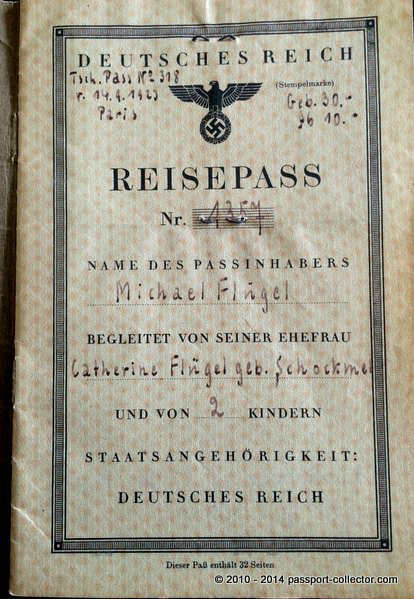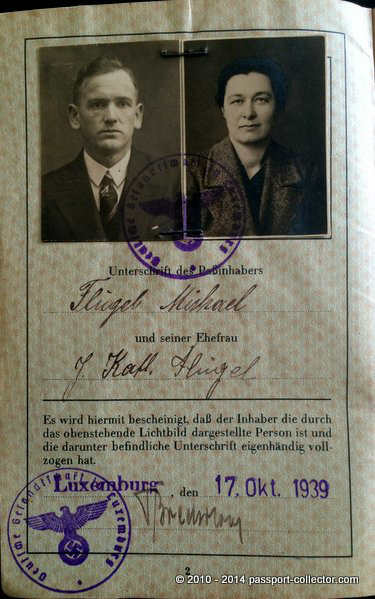Nazi Germany Passport issued in Luxembourg
This passport was issued on 17 October 1939 to Michael Flügel, his wife and two children just a few weeks after WWII begun but well before the German occupation of Luxembourg in May 1940. Another great item to my collection as German passports issued in Luxembourg are extremely hard to find.
________________________________________________________________________________
The Luxembourgish government had pursued a policy of neutrality since the “Luxembourg Crisis” of 1867 had highlighted the country’s vulnerability.During the First World War, the 400 men of the Corps des Gendarmes et Volontaires had remained in barracks throughout the German occupation.In March 1939, in a speech to the Reichstag, Adolf Hitler promised that Luxembourgish sovereignty would not be breached.
The strength of the military was gradually increased as international tension rose during Appeasement and after Britain and France’s declaration of war against Germany in September 1939. By 1940, the Luxembourgish army numbered some 13 officers, 255 armed gendarmes, and 425 soldiers.
The popular English-language radio station, Radio Luxembourg was taken off-air in September 1939, amid fears that it might antagonize the Germans. Apart from that, normal life continued in Luxembourg during the Phoney War; no blackout was enforced and regular trains to France and Germany continued.
In Spring 1940, work began on a series of roadblocks across Luxembourg’s eastern border with Germany. The fortifications, known as the Schusterline, were largely made of steel and concrete.
The involvement of the Grand Duchy of Luxembourg in World War II began with its invasion by German forces on 10 May 1940 and lasted beyond its liberation by Allied forces in late 1944 and early 1945.
After surrendering after just a day of fighting, Luxembourg was placed under occupation and was formally annexed into Germany in 1942. During the occupation, the German authorities orchestrated a programme of “Germanisation” of the country, suppressing non-German languages and customs and conscripting Luxembourgers into the Wehrmacht, which led to extensive resistance, culminating in a general strike in August 1942 against conscription. The Germanisation was facilitated by a collaborationist political group, the Volksdeutsche Bewegung, founded shortly after the occupation. Shortly before the surrender, the government had fled the country along with Grand Duchess Charlotte, eventually arriving in London, where a Government-in-exile was formed. Luxembourgish soldiers also fought in Allied units until liberation.
Before the war, Luxembourg had a population of about 3500 Jews, many of them newly arrived in the country to escape persecution in Germany. The Nuremberg Laws, which had applied in Germany since 1935, was enforced in Luxembourg from September 1940 and Jews were encouraged to leave the country for Vichy France. Emigration was forbidden in October 1941, but not before nearly 2500 had fled. In practice, they were little better off in Vichy France, and many of those who left were later deported and killed. From September 1941, all Jews in Luxembourg were forced to wear the yellow Star of David badge to identify them.
From October 1941, Nazi authorities began to deport the around 800 remaining Jews from Luxembourg to Łódź Ghetto and the concentration camps at Theresienstadt and Auschwitz. Around 700 were deported from the Transit Camp at Fuenfbrunnen in Ulflingen in the north of Luxembourg.
Luxembourg was declared “Judenrein” (“cleansed of Jews”) except for those in hiding on 19 October 1941. Of the original Jewish population of Luxembourg, only 36 are known to have survived the war.
FAQ Passport History
Passport collection, passport renewal, old passports for sale, vintage passport, emergency passport renewal, same day passport, passport application, pasaporte passeport паспорт 护照 パスポート جواز سفر पासपोर्ट
1. What are the earliest known examples of passports, and how have they evolved?
The word "passport" came up only in the mid 15th Century. Before that, such documents were safe conducts, recommendations or protection letters. On a practical aspect, the earliest passport I have seen was from the mid 16th Century. Read more...
2. Are there any notable historical figures or personalities whose passports are highly sought after by collectors?
Every collector is doing well to define his collection focus, and yes, there are collectors looking for Celebrity passports and travel documents of historical figures like Winston Churchill, Brothers Grimm, Johann Wolfgang von Goethe. Read more...
3. How did passport designs and security features change throughout different periods in history, and what impact did these changes have on forgery prevention?
"Passports" before the 18th Century had a pure functional character. Security features were, in the best case, a watermark and a wax seal. Forgery, back then, was not an issue like it is nowadays. Only from the 1980s on, security features became a thing. A state-of-the-art passport nowadays has dozens of security features - visible and invisible. Some are known only by the security document printer itself. Read more...
4. What are some of the rarest and most valuable historical passports that have ever been sold or auctioned?
Lou Gehrig, Victor Tsoi, Marilyn Monroe, James Joyce, and Albert Einstein when it comes to the most expensive ones. Read more...
5. How do diplomatic passports differ from regular passports, and what makes them significant to collectors?
Such documents were often held by officials in high ranks, like ambassadors, consuls or special envoys. Furthermore, these travel documents are often frequently traveled. Hence, they hold a tapestry of stamps or visas. Partly from unusual places.
6. Can you provide insights into the stories behind specific historical passports that offer unique insights into past travel and migration trends?
A passport tells the story of its bearer and these stories can be everything - surprising, sad, vivid. Isabella Bird and her travels (1831-1904) or Mary Kingsley, a fearless Lady explorer.
7. What role did passports play during significant historical events, such as wartime travel restrictions or international treaties?
During war, a passport could have been a matter of life or death. Especially, when we are looking into WWII and the Holocaust. And yes, during that time, passports and similar documents were often forged to escape and save lives. Example...
8. How has the emergence of digital passports and biometric identification impacted the world of passport collecting?
Current modern passports having now often a sparkling, flashy design. This has mainly two reasons. 1. Improved security and 2. Displaying a countries' heritage, icons, and important figures or achievements. I can fully understand that those modern documents are wanted, especially by younger collectors.
9. Are there any specialized collections of passports, such as those from a specific country, era, or distinguished individuals?
Yes, the University of Western Sidney Library has e.g. a passport collection of the former prime minister Hon Edward Gough Whitlam and his wife Margaret. They are all diplomatic passports and I had the pleasure to apprise them. I hold e.g. a collection of almost all types of the German Empire passports (only 2 types are still missing). Also, my East German passport collection is quite extensive with pretty rare passport types.
10. Where can passport collectors find reliable resources and reputable sellers to expand their collection and learn more about passport history?
A good start is eBay, Delcampe, flea markets, garage or estate sales. The more significant travel documents you probably find at the classic auction houses. Sometimes I also offer documents from my archive/collection. See offers... As you are already here, you surely found a great source on the topic 😉
Other great sources are: Scottish Passports, The Nansen passport, The secret lives of diplomatic couriers
11. Is vintage passport collecting legal? What are the regulations and considerations collectors should know when acquiring historical passports?
First, it's important to stress that each country has its own laws when it comes to passports. Collecting old vintage passports for historical or educational reasons is safe and legal, or at least tolerated. More details on the legal aspects are here...
Does this article spark your curiosity about passport collecting and the history of passports? With this valuable information, you have a good basis to start your own passport collection.
Question? Contact me...




